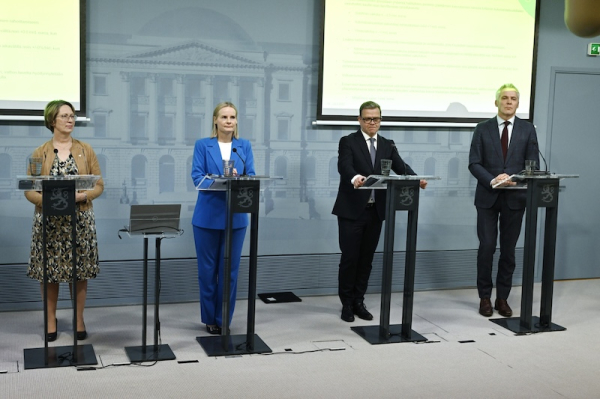
Minister of Agriculture and Forestry Sari Essayah (left), Minister of Finance Riikka Purra, Prime Minister Petteri Orpo, and Minister of Education Anders Adlercreutz at the government’s budget framework negotiations press conference in the Government Palace briefing room in Helsinki on 23 April 2025. Photo: Jussi Nukari / Lehtikuva
- Next Article Forestry industry calls for foreign labour to ease worker shortage
The Finnish government has unveiled sweeping changes to taxation and public spending as part of its midterm budget framework talks. Prime Minister Petteri Orpo’s coalition plans €1.25 billion in income tax reductions, while implementing deep cuts to higher education, foreign aid, and municipal services.
Finance Minister Riikka Purra described the measures as necessary to promote employment, strengthen consumer purchasing power, and support investment.
The government will lower income tax rates for all brackets, with particular emphasis on middle and low-income earners. The top marginal income tax rate will drop to 52 percent.
The corporate tax rate will fall from 20 to 18 percent from 2027, costing the state an estimated €830 million. The government will also lower VAT on food and medicines from 14 to 13.5 percent, while increasing taxes on sugary drinks, nicotine pouches, and e-cigarettes. These measures are expected to bring in €220 million in new revenue by 2029.
Inheritance and gift tax thresholds will rise. The inheritance tax exemption will increase from €20,000 to €30,000. The gift tax threshold will move from €5,000 to €7,500 in 2026. In addition, the government plans to reduce interest rates on inheritance tax payments.
At the same time, several public sectors will face budget reductions. Higher education funding will be cut by €30 million in 2026, €20 million in 2027, and €15 million annually from 2028 onwards. Municipal funding will be reduced by €75 million in 2026.
Universities will receive new research funding — €20 million in 2026 and €39 million per year from 2027 — but only after consecutive years of base funding cuts. Applied science universities will gain an additional €10 million in 2026 and €15 million from 2027 for research development.
The government will introduce tuition fees for non-EU and non-EEA students in vocational and upper secondary education. It also confirmed that the state will reduce annual grants to the Evangelical Lutheran and Orthodox churches by €10 million in both 2026 and 2027.
Foreign aid funding will be cut by €50 million per year. The reductions do not apply to domestic NGOs, though the Social and Health Organisations’ Funding Centre (STEA) will lose €10 million. Finland will, however, increase humanitarian support to Ukraine by €10 million annually.
The government also approved other changes aimed at improving public finances. Trade union and employer association membership fees will no longer be tax-deductible from 2026. This move is expected to raise €190 million per year.
Additional tax tightening includes eliminating deductions for home office expenses and the fringe benefit tax exemption for employer-provided bicycles. Combined, these measures are projected to increase state revenue by €70 million annually.
Other adjustments target tax avoidance. The government will prevent the misuse of share exchange schemes in dividend tax minimisation, including those used by social media influencers. The reform is estimated to raise €30 million in tax revenue.
State leaders will also take a personal cut. Ministerial salaries will be reduced by five percent starting in 2026.
Despite the cuts, the government confirmed additional spending on specific priorities. Defence funding will rise to 3 percent of GDP by 2029, adding €3.6 billion during the budget period. Personal carer support payments will increase, and the right to palliative care will be guaranteed nationwide.
The government allocated €42 million to improve the Savo railway line and €2.5 million annually from 2027 to restore passenger rail service between Tampere and Rauma. Regional air connections will be maintained until early 2028.
Small and mid-sized businesses will benefit from €30 million in new development funds between 2026 and 2028. The national hobby model for school-age children will receive a permanent increase of €5 million.
The budget also reflects new policy reversals. The government has dropped a previously proposed change that would have made the first day of sick leave unpaid. That plan will no longer proceed.
HT
- Next Article Forestry industry calls for foreign labour to ease worker shortage
Source: www.helsinkitimes.fi
